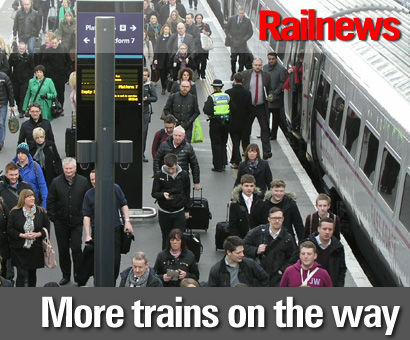TRAIN operators have forecast that nearly 1,300 more passenger trains will be running each weekday by 2021.
The rise would be an increase of just over six per cent, compared with the 20,176 trains being run on an average weekday last year.
Operators are already running 3,150 more trains a week than they did four years ago, while the total number of trains in the passenger timetable has increased by more than 30 per cent from the 1997 figure of around 15,380 daily services.
Analysis of draft timetables by the Rail Delivery Group suggests that future increases will be particularly concentrated on London commuter routes and intercity routes between London and Scotland, but there will also be more trains on other lines in most areas of England and Wales.
The number of passengers has almost doubled since 1997, although the reasons for the increase are not clear. Passenger kilometres were 34.1 billion in 1997, compared with 65 billion last year. This is easily an all-time record, being almost 15 per cent more than the previous record year of 1945.
RDG chief executive Paul Plummer said: “Rail is an ever more vital public service, enabling jobs, housing and economic growth. But there’s a capacity crunch affecting the railway, with journeys having doubled in 20 years and the number of trains increasing too. That’s why we’re delivering billions of pounds of improvements and reversing decades of under-investment.”
Lianna Etkind of the Campaign for Better Transport welcomed the news, as it would ‘ease the overcrowding which makes so many commuters' lives a misery’. She added: “Alongside more frequent trains the Government and operators must also invest in longer trains and prioritise connecting smaller towns and villages to the public transport network, to ensure rail offers a viable and environmentally responsible alternative to car travel.”
Rail union leaders were critical. RMT general secretary Mick Cash said: "Like most people we will believe this when we see it. There simply aren't the trains and staff available to make this plan happen. Fault for that lies smack at the door of over two decades of privatisation.
"The train operators are already struggling to run current services and timetables due to a chronic lack of investment and the drive across the industry is to hack back on staff in the search for fatter profits. Our guards are in the front line of that attack on jobs and safety.
"Like so much of the spin from our rip-off private train companies these big promises of additional capacity are doomed to turn to dust.”
Manuel Cortes, general secretary of the Transport Salaried Staffs Association, said: "While I welcome the RDG's aspiration, I'm weary of their spin. I'm sure many passengers will be asking themselves why rather than always promising jam tomorrow, they simply just don't get on with running quality train services today.”


